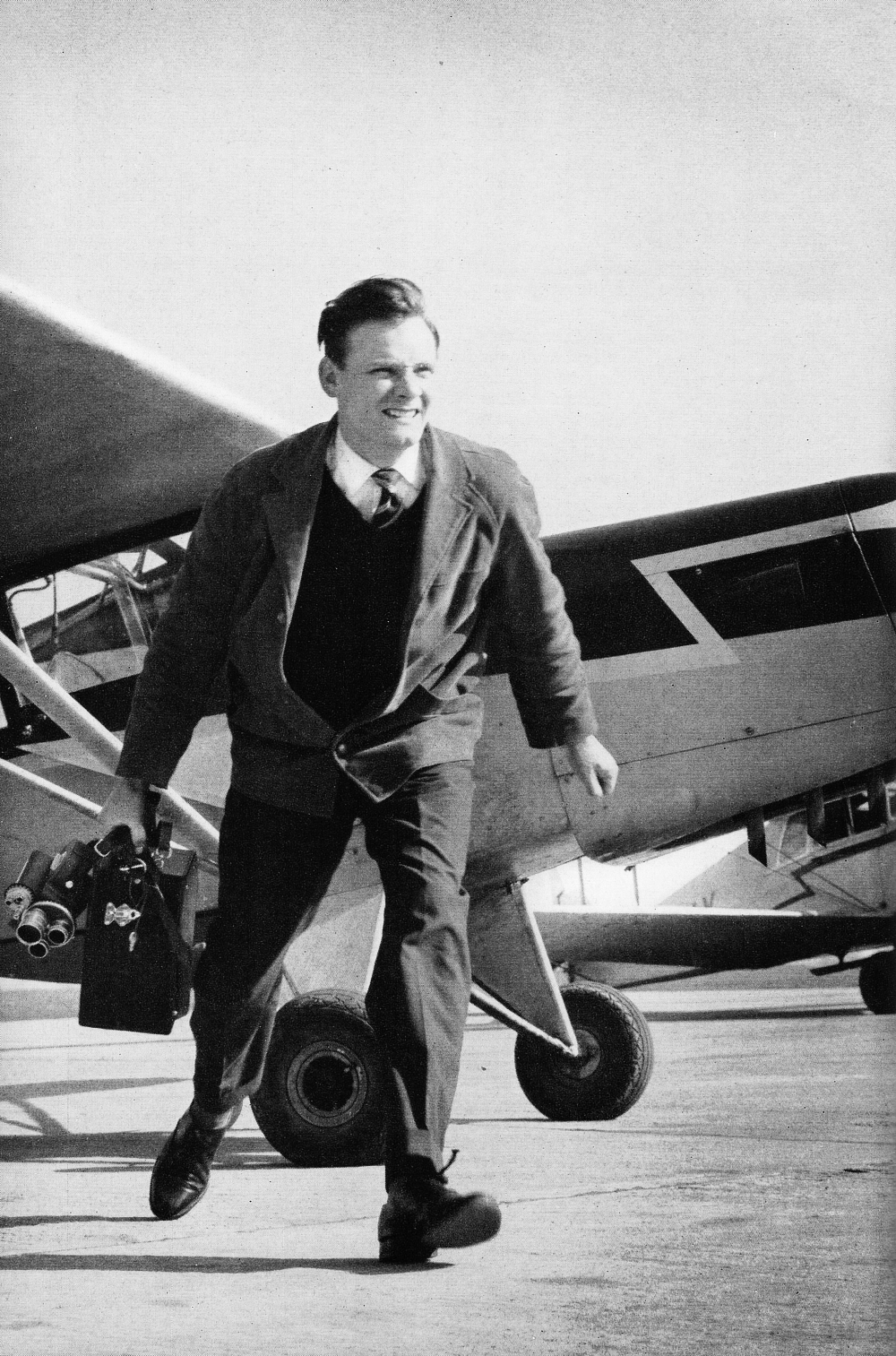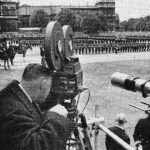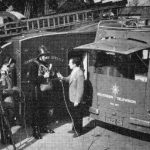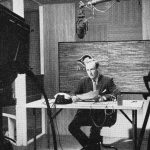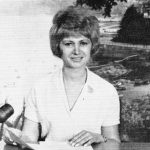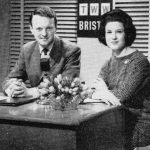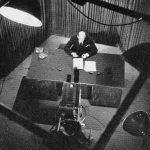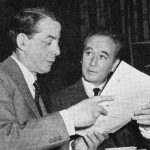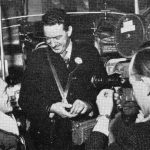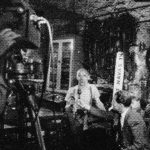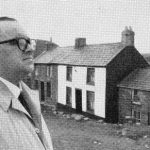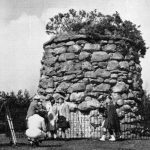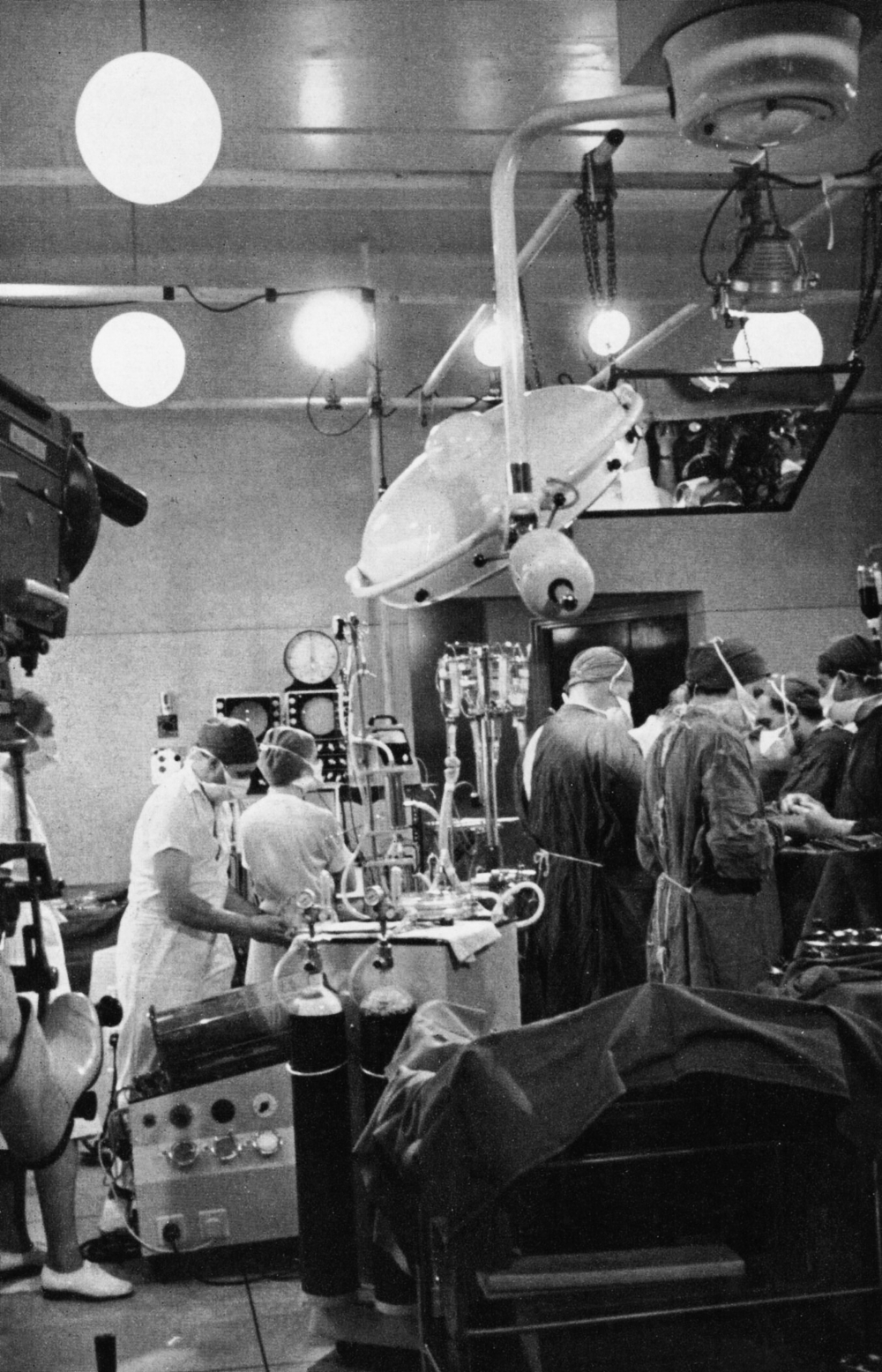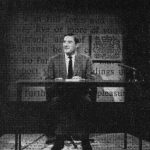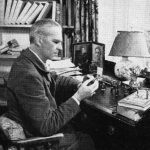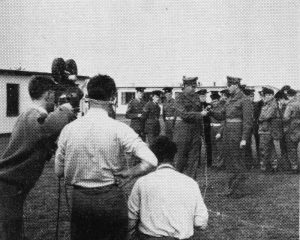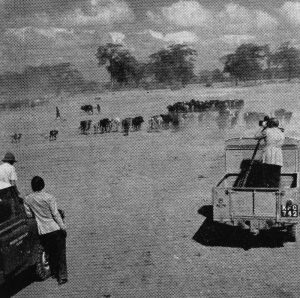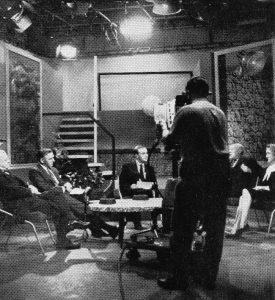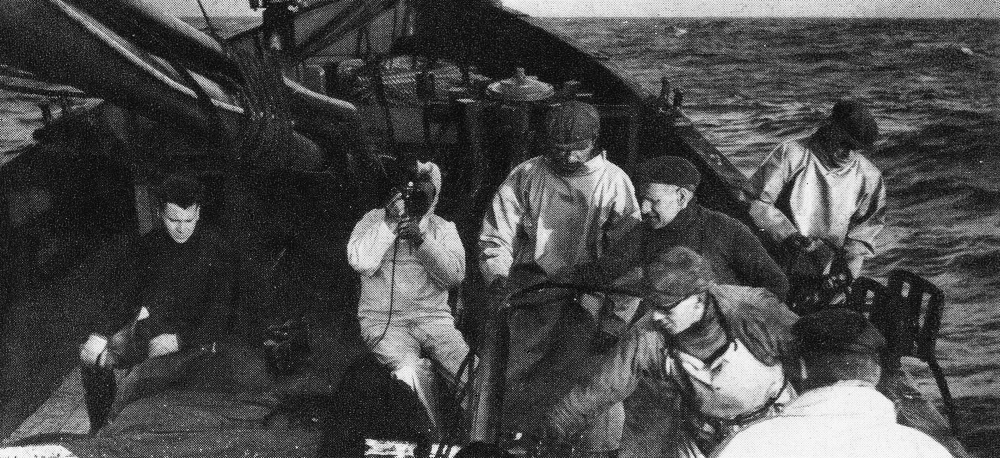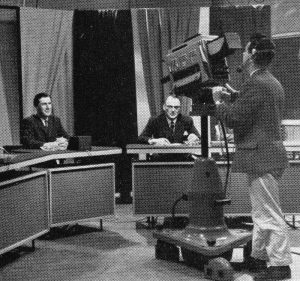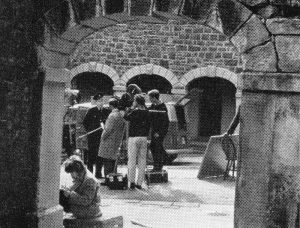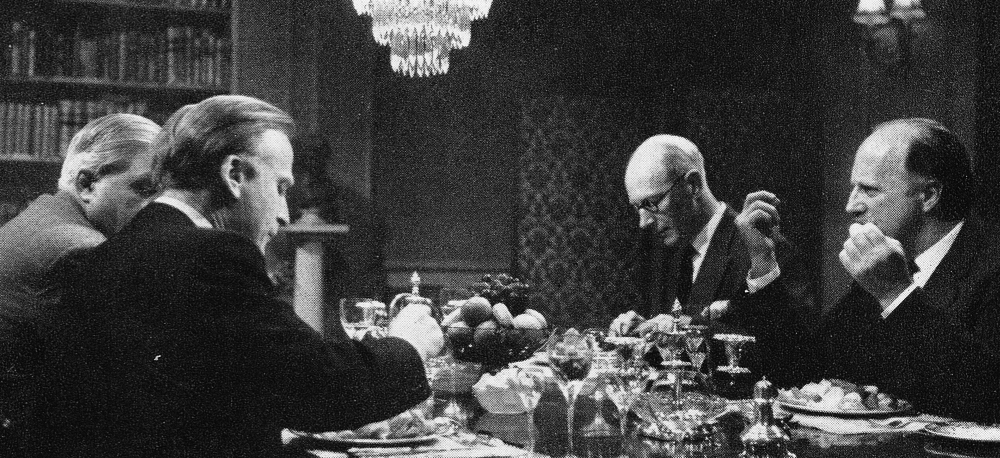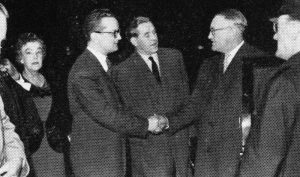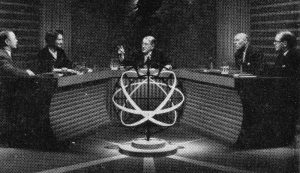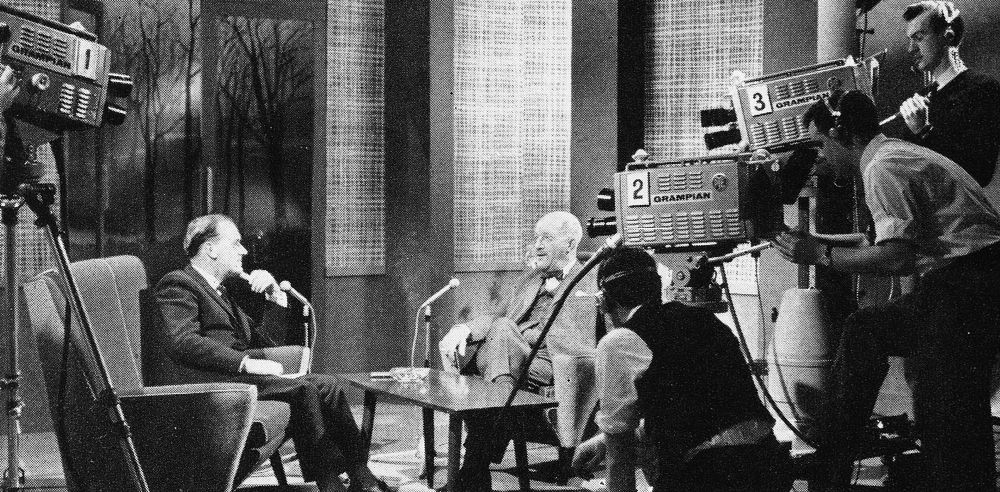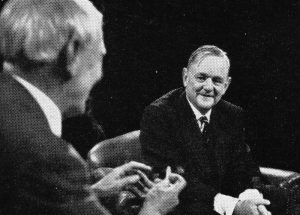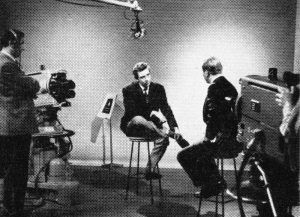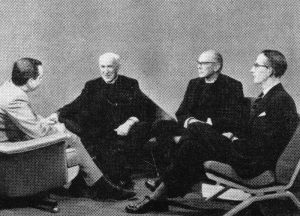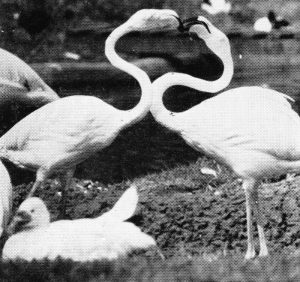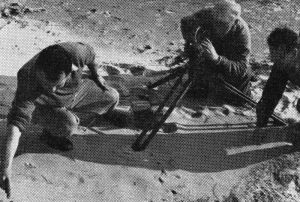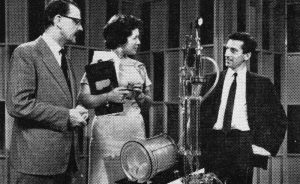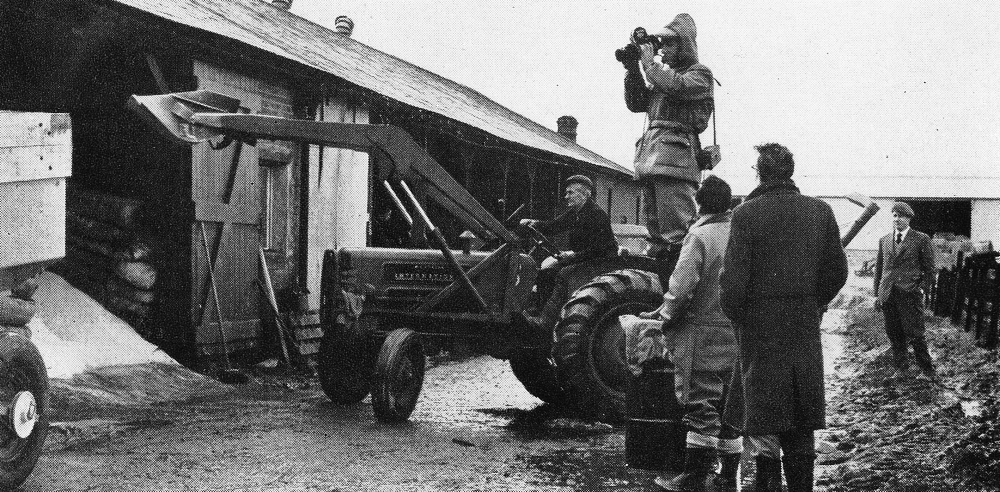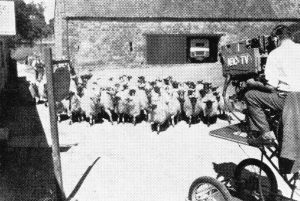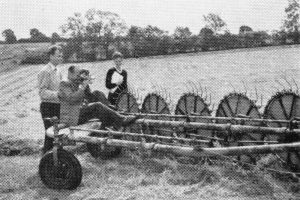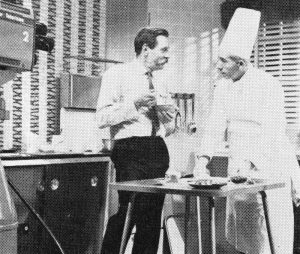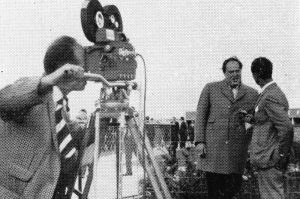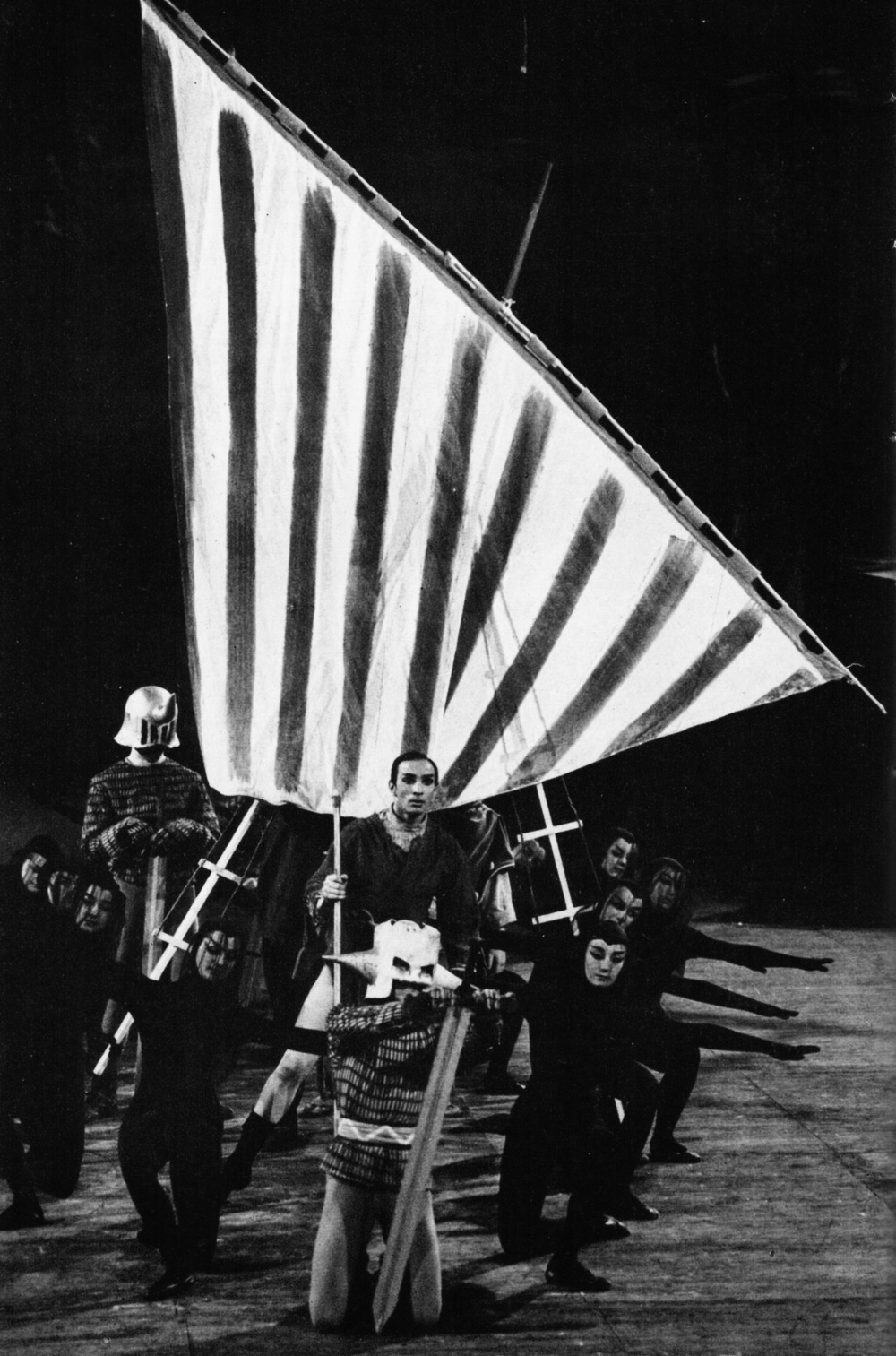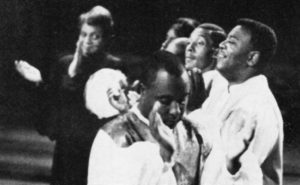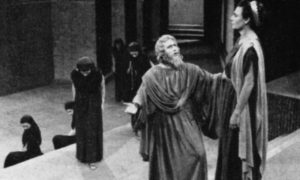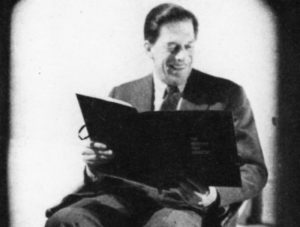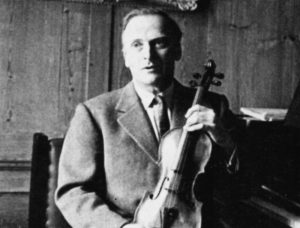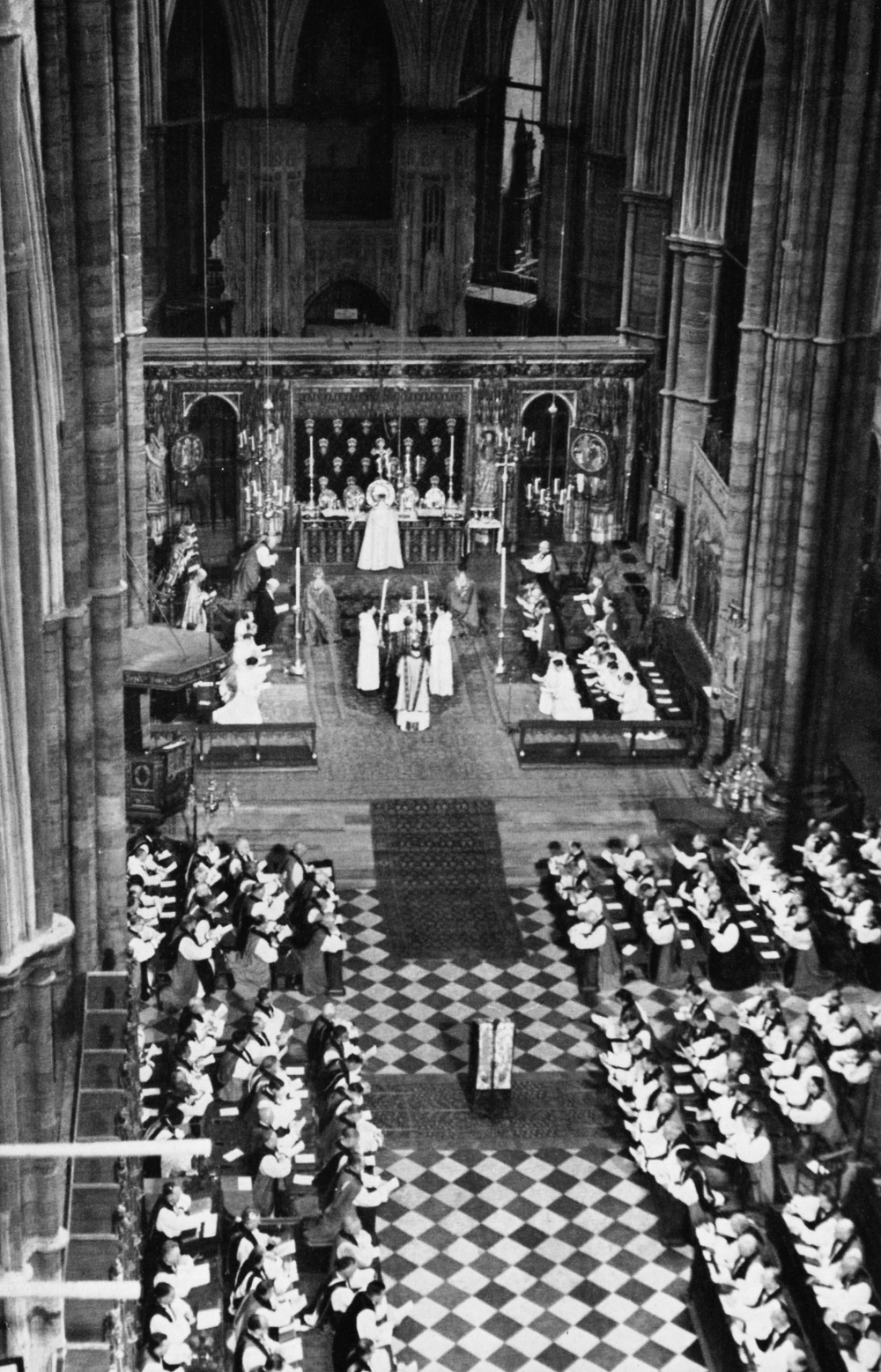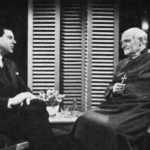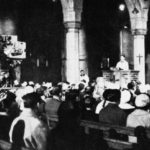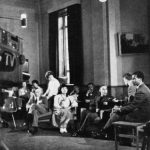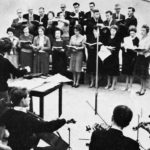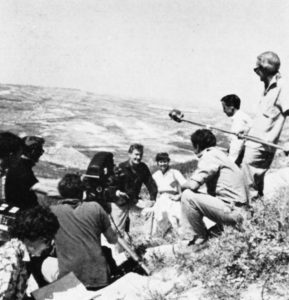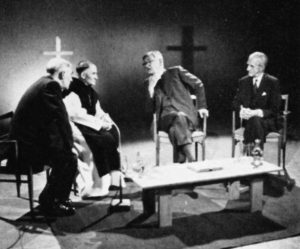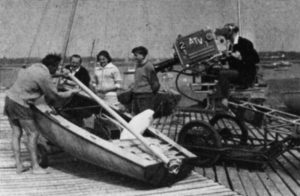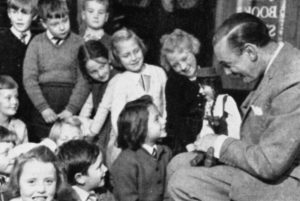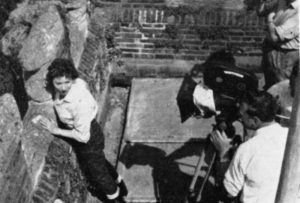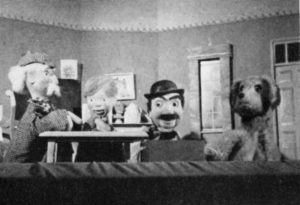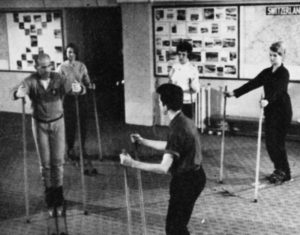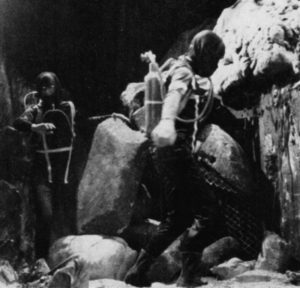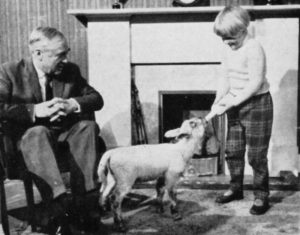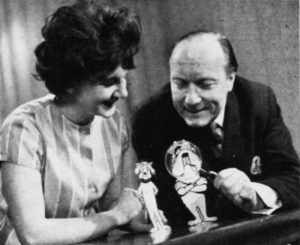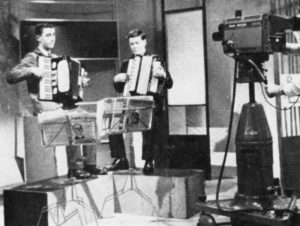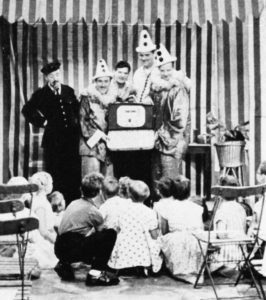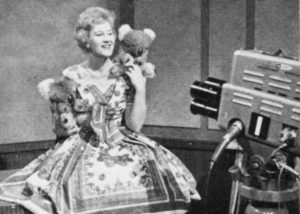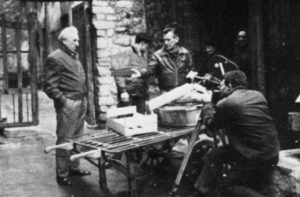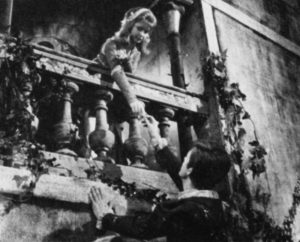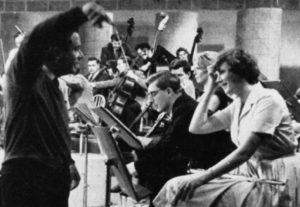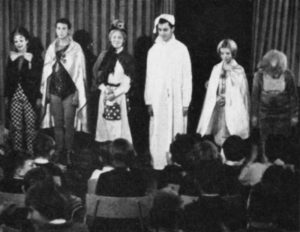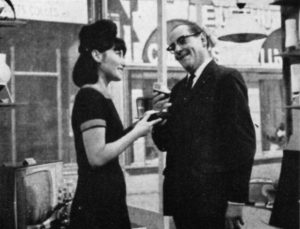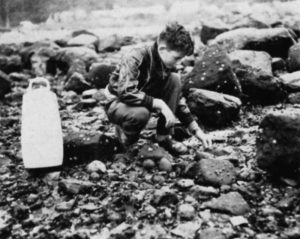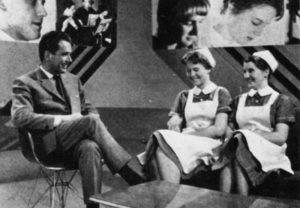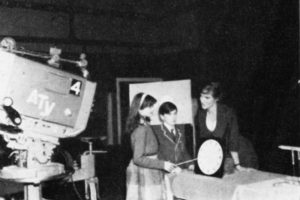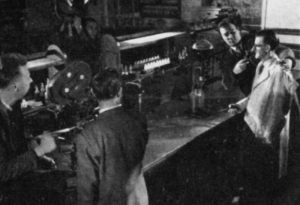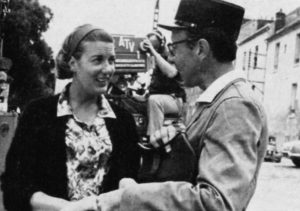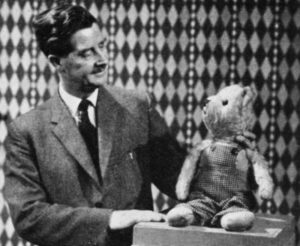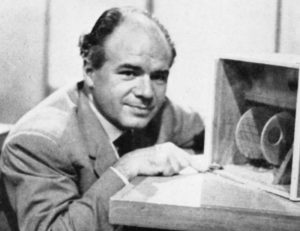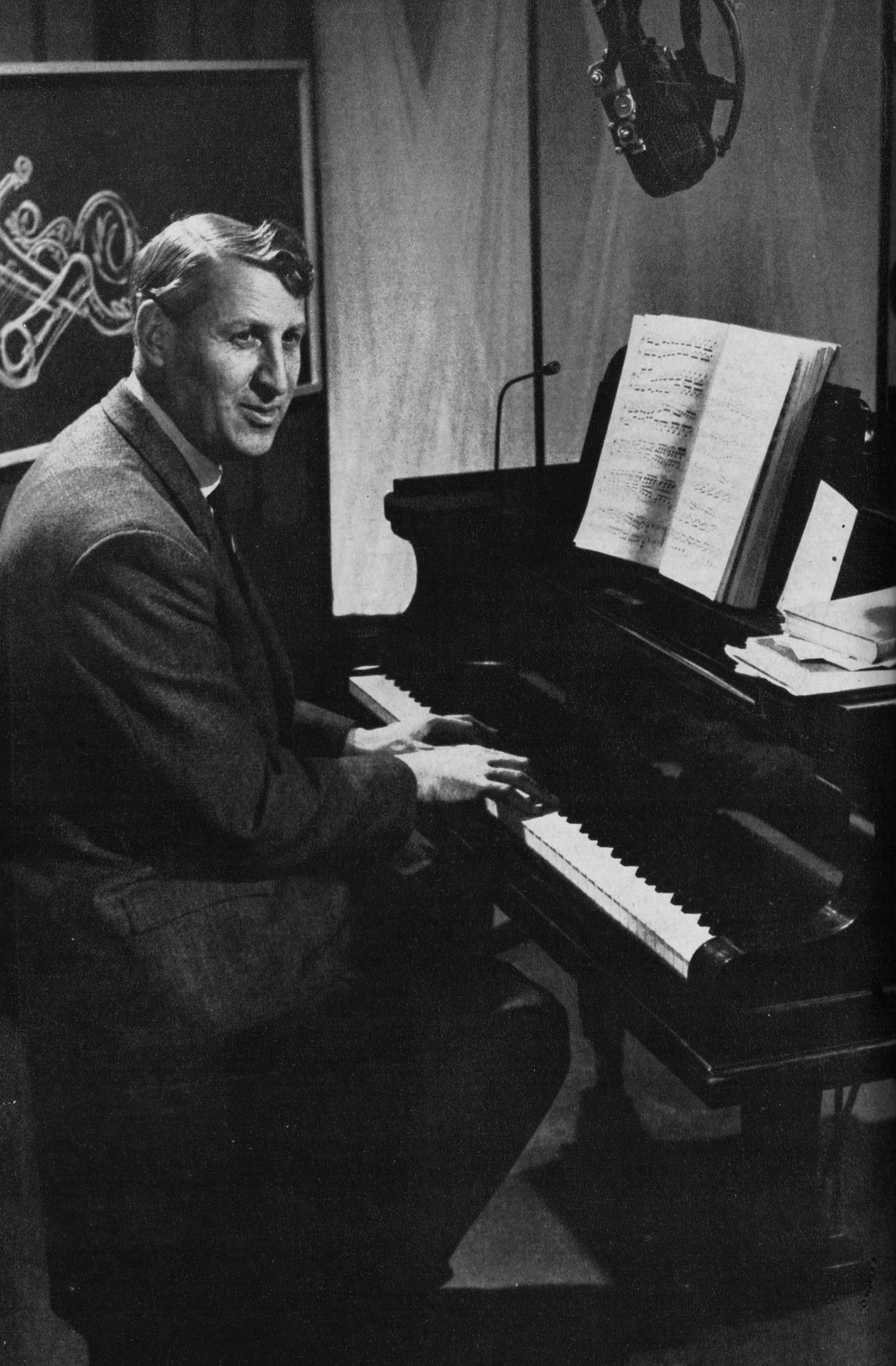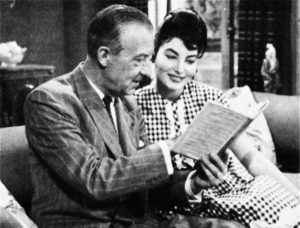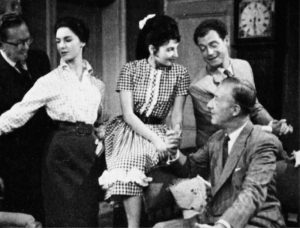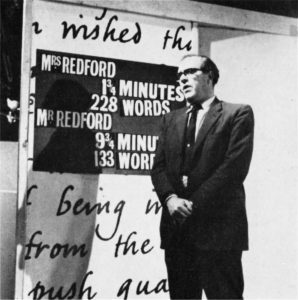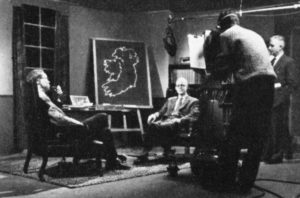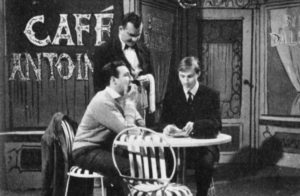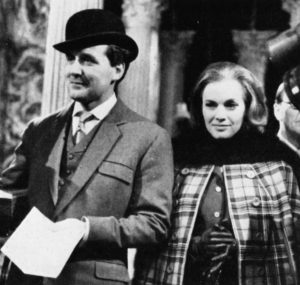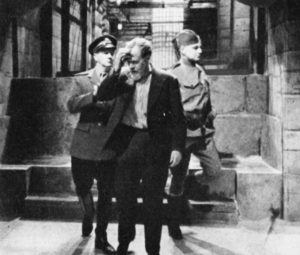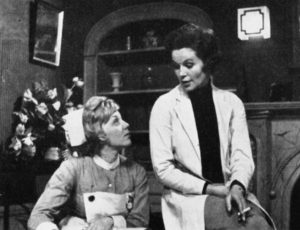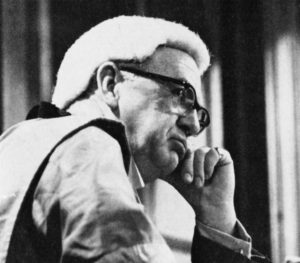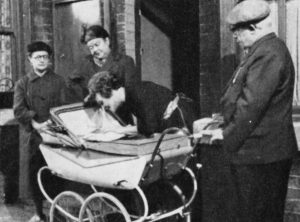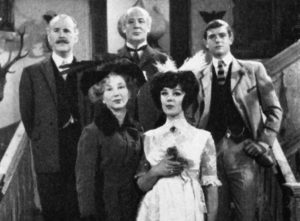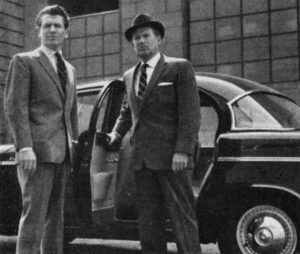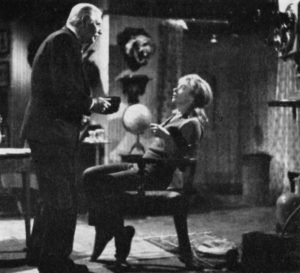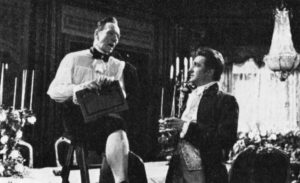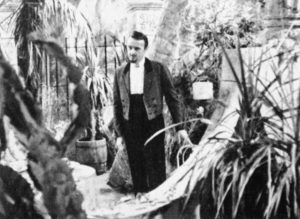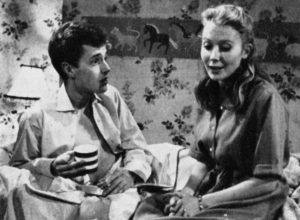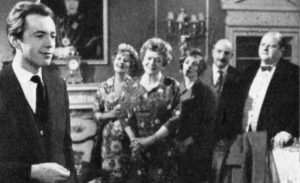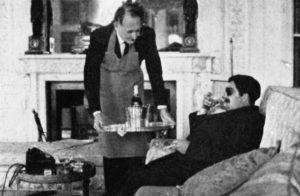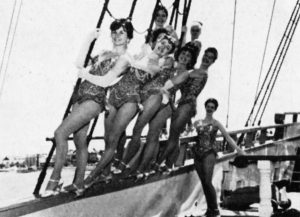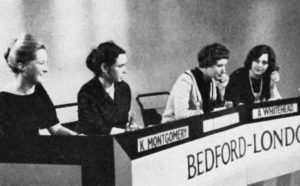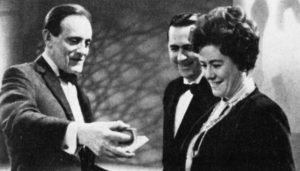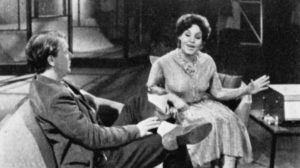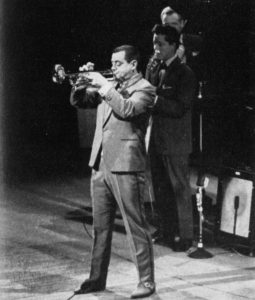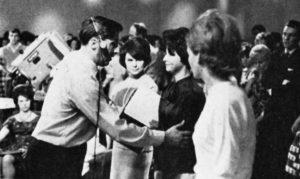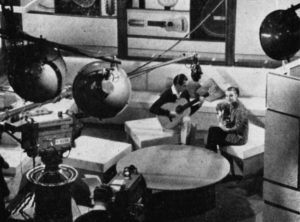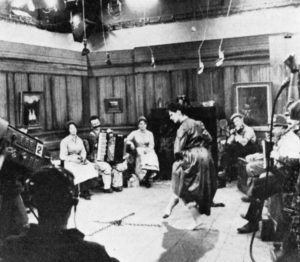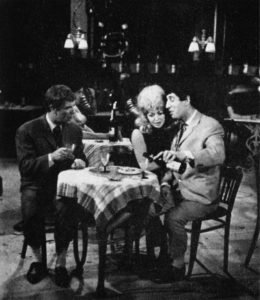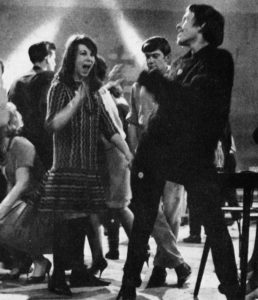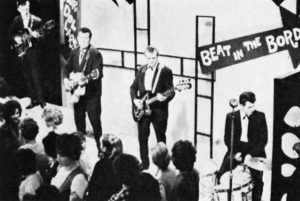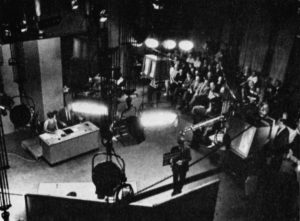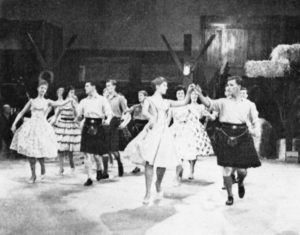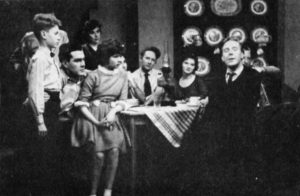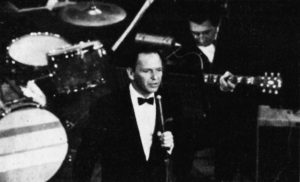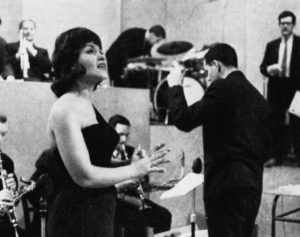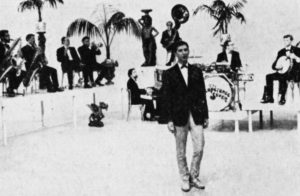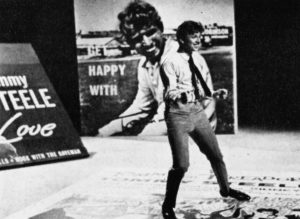The Position under the Act
The Television Act 1954 defines the various functions in the programme field of the Authority and the programme companies. The programmes, says Section 2 (2), shall “be provided not by the Authority but by persons who, under contracts with the Authority have the right and the duty to provide programmes or parts of programmes to be broadcast by the Authority”.
The required standards of programmes are set out in Section 3:
- the programmes must not offend against good taste or decency, or be offensive to public feeling, or contain any offensive reference to a living person;
- programmes on controversial subjects must be impartial; and
- the programmes must maintain a proper balance in their subject-matter and a high general standard of quality.
- Religion. Before the commencement of Independent Television about 30 minutes a week were devoted to religious programmes. Today there are 5 hours of regular programmes in the two services, nearly a tenfold increase.
- Schools Television. Programmes for schools were first broadcast in Independent Television’s second year. Today more than 20 series are shown each school week, with a total running time, including repeats, of about 15 hours.
- The News. In 1955 the news consisted of a single “news and newsreel” each evening. Today in the two services there are four main bulletins. Together with shorter bulletins, but excluding the regional bulletins, they provide six and a half hours of news a week.
- Talks, Discussions, Documentaries. In 1955 there were twelve to fifteen programmes a week covering the arts, science and nature, social life, and current affairs. Today there are in the two services over fifty such programmes, with a duration of about 18 hours.
- Regional Programmes. In 1955 total production outside London came to about five hours a week. Today the regional programmes amount to over one hundred hours a week.
- Broadcasting hours shall not exceed:
- 50 hours a week;
- 8 hours on any one day.
- The following broadcasts shall not be taken into account for the purposes of rule 1:
- Religious programmes (i.e. acts of worship from a church or studio* and other programmes which the Authority, with the advice of the Central Religious Advisory Committee, approves for broadcasting under the terms of Section 3 (4)(a) of the Television Act 1954);
- Ministerial and party political broadcasts;
- Outside broadcasts, up to a maximum of 350 hours in any one calendar year, of events which are neither devised nor promoted by the Authority or its programme contractors;
- Any broadcasting in excess of 8 hours on Christmas Eve, Christmas Day, Boxing Day, New Year’s Eve or New Year’s Day;
- School Broadcasts;
- Repeats of School Broadcasts during school holidays of up to one hour daily for a total of ten days;
- Broadcasts in the Welsh language;
- Broadcasts of a “parade” of new advertisements, made before 12 noon on one day a week (other than a Sunday).
- On Sundays:
- There shall be no broadcasting between 6.15 p.m. and 7.25 p.m.; but this paragraph does not apply to religious programmes as defined in rule 2 (i); or to outside broadcasts of events which are neither devised nor promoted by the Authority or its programme contractors, or to programmes in the Welsh language;
- Any programmes between 2 p.m. and 4 p.m. are to be designed for adults.
- The Postmaster-General has granted an additional hour of broadcasting on Sundays between 10 a.m. and 11 a.m. for an experimental period of three months for the transmission of adult educational programmes.
Other requirements relate to accuracy and impartiality of news, the use of British material and the inclusion of matters of special local interest.
Section 6 (1) provides that the contracts between the Authority and the companies shall contain “all such provisions as the Authority think necessary or expedient for complying and securing compliance with the provisions of this Act and any restrictions or requirements imposed thereunder in relation to the programmes provided by the programme contractors”.
The Practice of the Authority
The Authority in its contracts with the programme companies has reserved to itself aU the formal powers of programme control required by the Act. It recognised, however, at a very early stage of its operations that the kind of relationship with the companies envisaged by the Act, that is to say one based primarily on the idea of retrospective correction, accompanied by the exaction of penalties in some cases, was impracticable and undesirable. First, it was clear that the observance of the programme standards of Section 3 of the Act could not be secured merely retrospectively. Television is an expensive and exacting medium where programmes must be planned well in advance. Once programme schedules have gone into operation, it is difficult to correct or change them to any great extent; influence over programme policy can be most effectively exercised in the formative phase. Secondly, the Authority realised that its substantial powers could form no part of its normal relationship with companies, the selection of which depended on their being willing and able to provide programmes which would comply with the requirements of the Act.
The Authority has, therefore, sought to exercise influence with the companies not so much by its formal legal powers (though these remain ultimately exercisable) but rather by the development of the concept that Independent Television should operate on the basis that both the Authority and the companies have a common aim — that of producing good television which conforms with the Act. As a result, the Authority receives as a matter of routine full information about forthcoming programmes, on which consultation takes place as necessary between the Authority’s staff and the programme companies.
The practice of informal consultation is based on the idea that the companies should establish within their own organisations the necessary routines and procedures for ensuring that the programmes which are provided satisfy the requirements of the Act. A necessary part of these routines and procedures is that the Authority’s staff, who are always available for this purpose, should be consulted whenever any point of doubt arises. The Authority for its part is able without undue formality to ask for further clarification about forthcoming programmes.
Informal consultation is supplemented, as necessary, by consultation between the Authority and all the programme companies on the Standing Consultative Committee. While its field of responsibility covers all matters of common interest to the Authority and the programme companies, much of its work is concerned with programme matters. If, out of the day-to-day consultation between the Authority’s staff and the companies, matters of general application or interest arise they can be conveniently discussed by the Committee and an agreed procedure arrived at.
It has become the practice of Independent Television for programme schedules to be drawn up on a seasonal basis four times a year; there are, therefore, the winter, spring, summer and autumn schedules to be considered each year. The Authority receives information about the schedules well in advance and is able to comment on them from the point of view of balance and quality as it wishes.
Programme Balance
The Act requires balance, but it does not define it in any way and it is left to the Authority to decide whether balance is being secured and, if in the Authority’s view it is not, to say in what ways the position can be rectified. In the first year or so of transmissions after the opening of programmes in September 1955, the Authority’s practice was largely to assess balance retrospectively, in accordance with the strict provisions of the Act. After about a year, however, the Authority came to an agreement with the programme companies as to the elements which must be present in programmes if the intentions of the Act were to be observed. In broad terms these elements were:
(a) adequate daily news bulletins; (b) religious programmes; (c) political programmes; (d) social programmes; (e) documentary programmes; (f) cultural programmes (i.e. the arts, history and science); (g) school programmes.
Some of the items in this list were already being presented; others, for example religious and school programmes, were proposed by the programme companies. Since 1957 all the above items have been, though not necessarily in all service areas at all times, essential elements in Independent Television programmes. An indication of the results achieved by this policy is given in the following sections.
The Total Output of Programmes
Each week the fifteen programme companies of Independent Television provide for the Authority’s transmissions a total of about 183 hours of separate programmes. Of these, about 60-65 hours will be seen in any single area.
Of this total of 183 hours, the companies will have produced about 137 hours themselves, the remaining 46 hours consisting of about 30 hours of recorded programmes made in the United States, of which about 8 may be shown in any one service area, and about 16 hours of films made for television or the cinemas in Britain, or occasionally in British countries overseas, which they have acquired. These films will often have been made by subsidiaries of the companies or in association with them.
The total of 183 hours of produced or acquired programmes consists of about 550 separate programmes, ranging from short news bulletins or epilogues of a few minutes up to the hour-long church services and documentaries and the even longer plays and feature films.
The 60-65 hours of programmes seen in any one area, consisting of network programmes and local programmes for that area, are thus less than half the total output of Independent Television. The remaining 115-120 hours consist mostly of groups of programmes of specifically local appeal produced in other areas of the country, and seen only by their regional community.
Some of these 550 programmes are the 150 or so network programmes, and these will be shown in all fourteen service areas or in most of them either simultaneously or at some other time (in all of which cases they are counted in these figures as only one programme). Others, the locally presented programmes, will generally be seen in only one area.
The companies’ own production of 137 hours a week divides thus:
Weekly Programme Production
| Hours | Percentage of time | |
|---|---|---|
| News | 15 | 11 |
| Talks, discussions, documentaries | 40½ | 30 |
| Religion | 11½ | 8 |
| School programmes (excluding repeats) | 4½ | 3 |
| Other children’s programmes: | ||
| (a) informative | 4¾ | 3 |
| (b) entertainment | 3 | 2 |
| Plays and serials | 12¼ | 9 |
| Opera, ballet and music | ¾ | 1 |
| Variety and other entertainment | 20 | 15 |
| Quizzes and panel games | 3½ | 2 |
| Sport | 16 | 12 |
| Welsh language | 5¼ | 4 |
| 137 | 100 |
Growth of Serious Programmes
Classification of television programmes into “informative” and “entertaining”, or “serious” and light”, presents its difficulties and the terms certainly cannot be taken to correspond with “valuable” and “worthless”. A play is “entertainment”, but it may have a purpose more serious and a value more significant than a poor political discussion. Indeed, it may take the form of a political statement in dramatic shape, or seek to illuminate a particular social problem, or human dilemma. But these refinements escape any statistical net, and it is best to make a simple separation of news and news magazines, programmes of information, discussion, debate, talks, practical instruction, religious and school programmes, and all programmes of fact as belonging to the “serious” side of television. As drama, however fine, is excluded from the tabulation of serious programmes, so also are opera, ballet, and serious music. Outside broadcasts are included according to their nature — sport as sport, spectacle as entertainment, informative as documentary.
It is sometimes said that most people wish to be entertained by television, not informed or educated. This is a remark that can miss the point. People wish to be interested by television: or rather, if a programme of any kind excites their interest and holds their attention, they will watch it as undistractedly if it is a programme of fact as if it is a variety show. Analysers like to do their sums in terms of programme classes. The viewer divides programmes into two classes: the interesting and the boring.
The following table measures the growth of serious programmes in Independent Television from 1956 to the half-way point of 1959 and then to 1962. In duration, it shows an increase of 74 per cent to the half-way point, and of a further 39 per cent when 1962 is compared with 1959. As a proportion of total running time, it shows similar increases of 37 per cent and of 35 per cent.
The Growth of Serious Programmes
London: weekly averages in 1956, 1959, 1962
| Duration | Proportion | ||||||||
|---|---|---|---|---|---|---|---|---|---|
| 1956 | 1959 | 1962 | 1956 | 1959 | 1962 | ||||
| hrs. | mins. | hrs. | mins. | hrs. | mins. | % | % | % | |
| News | 3 | 15 | 3 | 15 | 4 | 00 | 7 | 5 | 6 |
| Talks, discussions, documentaries | 3 | 56 | 4 | 32 | 8 | 38 | 8 | 7 | 13 |
| Religion | 1 | 05 | 2 | 22 | 3 | 07 | 2 | 4 | 5 |
| School programmes (including repeats) | None | 4 | 35 | 5 | 15 | – | 7 | 8 | |
| Other informative children’s programmes | 1 | 08 | 1 | 40 | 1 | 45 | 2 | 3 | 3 |
| TOTAL | 9 | 24 | 16 | 24 | 22 | 45 | 19 | 26 | 35 |
Note – The above table shows the weekly average running times during the two weeks ended 20th October 1956, the two weeks ended 24th October 1959, and the two weeks ended 21st October 1962.
Of a total of about 12 million homes able to watch both ITV and BBC, nearly 60 per cent (7 million homes) are already watching one service or the other between 6 and 7 p.m. Between 7 and 7.30 p.m. this figure rises to about 65 per cent (8 million homes). It rises again to about 80 per cent (9J million homes) between 7.30 and 8 p.m. At this point it remains more or less stable until 10 p.m. By 10.30 p.m. the proportion of homes viewing has fallen to 65 per cent, and by it p.m. to about 60 per cent. Thus the steady summit lies between 8 and 10 p.m., with well-populated slopes on either side.
BBC television usually finishes at about ii p.m. The ITA transmissions continue usually for about another 45 minutes. It might be noted that programme analyses restricted to the period 7 to 10.30 p.m. are not only incomplete but also artificial, for this section of the evening does not tally with any known audience patterns.
Viewing patterns change with the day’s weather and with the seasons. Tabulated for an average month, the proportion of television homes viewing is:
| 6-8 p.m. (early evening) | 65% |
| 8-10 p.m. (middle evening) | 80% |
| 10-11 p.m. (late evening) | 58% |
Duration and Proportion of Serious Programmes
Evening hours in London averaged over the thirteen weeks ended 21st October 1962
| Period | Duration | Proportion | |
|---|---|---|---|
| hrs. | mins. | per cent | |
| 6-8 p.m. | 5 | 10 | 37 |
| 8-10 p.m. | 2 | 17 | 16 |
| 10-close | 4 | 36 | 36 |
| 12 | 3 | 30 | |
The above table shows, in total duration and as a percentage of total time, the distribution of serious evening programmes in Independent Television. It should be noted that drama, opera, ballet and serious music are excluded.
The Regional Programmes
Of the 137 hours of different programmes, excluding acquired films, which the fifteen separate companies of Independent Television themselves produce each week, some 78 hours, or more than half, are produced by the eleven predominantly regional companies.
These regional programmes, produced in Glasgow, Belfast, Cardiff, Bristol, Southampton, Dover, Newcastle, Carlisle, Aberdeen, Norwich, Plymouth and the Channel Islands, arise from the individual character of the separate regions, concern themselves with regional affairs or give expression to local talents, and are designed specially to appeal to local interests and add to the significance of local life. They may fairly be said to represent one of the distinctive contributions of Independent Television to British broadcasting. They spring from an act of policy: the decision that the shape of Independent Television should be not unitary but plural, as little as possible centralised, as much as possible dispersed and varied. They reflect in programmes the marked institutional change that while throughout the first 12 years of British television (1936-39 and 1946-55) there was only one organisation producing programmes, there were in 1956 five, in 1957 six, in 1958 eight, in 1959 eleven, in i960 twelve, in 1961 fourteen, and by the end of 1962 sixteen. These range in size from the BBC, by far the biggest single television producer, down to Channel Television in St. Helier, the smallest.
It is not easy further to summarise the aggregate of these 78 hours of local programmes, for they tend to vary in accordance with the personality of the company and the interests, tastes, and talents of the region. But in every ITV region there are local news bulletins daily from Monday to Friday, and in every region there are regular news magazines. These vary in length from 15 minutes to 40 minutes, and they vary in frequency from two days a week to five. Local news and local news magazines together account for about 36 per cent (28 hours) of the aggregate of local programmes. Talks, discussion and documentary programmes account for a further 18 per cent (14 hours) and religious programmes for 10 per cent (8 hours). The remaining 36 per cent (28 hours) consists mostly of local entertainment programmes.
Although the distinction of main productive function between the four major companies of Independent Television and the eleven regional companies is important to its operation, programmes of regional interest are also produced in the North, the Midlands, and London, where the four major companies operate. These consist largely of news, news magazines, talks, discussions and documentaries. Their weekly running time is about 15 hours, and this output, added to the 78 hours from the eleven regional companies, produces a figure of over 93 hours of local programmes out of the total weekly production of 137 hours. Including network programmes produced in Manchester and Birmingham, Independent Television produces outside London well over 100 hours of programmes a week.
The Effects of Competition
Among developments which have taken place in British television since the start of Independent Television in 1955 are:
London Programmes: Thirteen Weeks ended 21st October 1962
Weekly Average
| Duration | Proportion | ||
|---|---|---|---|
| hrs. | mins. | per cent | |
| News | 4 | 07 | 7 |
| Talks, discussions, documentaries | 8 | 41 | 14 |
| Religion | 2 | 59 | 5 |
| School programmes (including repeats) | 2 | 05 | 3 |
| Other children’s programmes: | |||
| (a) informative | 1 | 47 | 3 |
| (b) entertainment | 5 | 16 | 8 |
| Plays and serials | 10 | 23 | 16 |
| Opera, ballet and music | 05 | – | |
| Variety and other entertainment | 4 | 38 | 7 |
| Entertainment films | 12 | 32 | 20 |
| Quizzes and panel games | 2 | 02 | 3 |
| Sport | 8 | 47 | 14 |
| Afternoon programmes | – | – | – |
| Welsh language | – | – | – |
| Ceremonial occasions | 12 | – | |
| 63 | 34 | 100 | |
Note – The duration of programmes is transcribed from the programme journals. The times shown thus include programme announcements. An average of about 35 minutes of spot advertising each day is included, a more than proportionate part of it with the entertainment programmes. Excluded from the table are about 45 minutes of advertising magazines a week. School programmes were not shown during school holiday period. The normal duration of school programmes is 5 hours 15 minutes (excluding repeats: 3 hours 39 minutes). ITA’s Welsh programmes are not shown in London. These factors could have a marginal effect on the percentages.
Hours of Broadcasting
The permitted hours of television broadcasting are determined by the Postmaster-
General. The present rules are:
Party Political Broadcasts
The allocation of television broadcasting time for Party Political Broadcasts is agreed each year by the major political parties and the broadcasting authorities. The current series of Party Political Broadcasts cover the period from 1st July 1962 to 20th June 1963.
| { | 1 of 25 minutes | } | ||
| four | 1 of 20 minutes | broadcasts by the Conservative Party | ||
| 2 of 15 minutes | ||||
| { | 1 of 25 minutes | } | ||
| four | 1 of 20 minutes | broadcasts by the Labour Party | ||
| 2 of 15 minutes | ||||
| two | 25 minutes | broadcasts by the Liberal Party | ||
All parties have the option of splitting their 25 minute broadcast into two; that is, one of 15 minutes and one of 10 minutes

